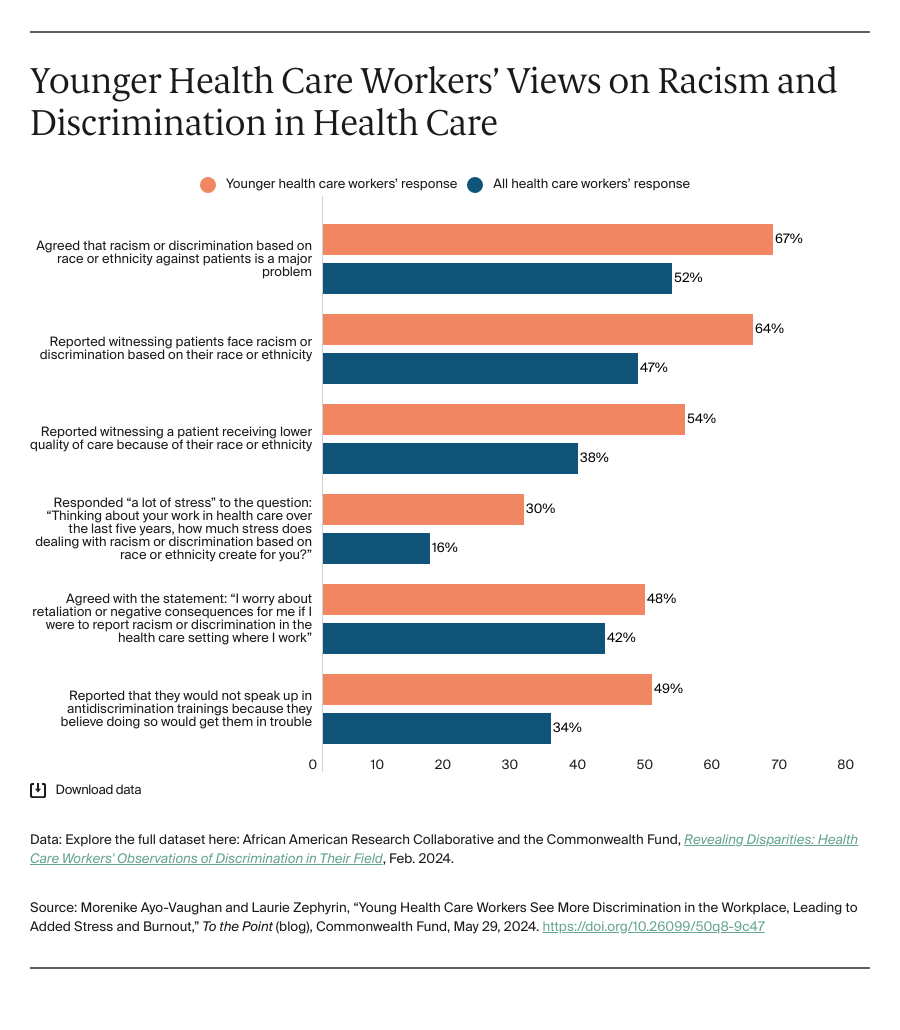A recent survey of 3,000 health care workers revealed that younger clinicians ages 18–29 — nurses, doctors, dentists, medical assistants, and others — were significantly more likely than older clinicians to report witnessing racial discrimination against patients. The survey reported on health care workers’ observations of discrimination against patients, how this discrimination impacts patient care, and how it affects the health care workers who witness it.
Younger health care workers more frequently than health care workers overall agreed that racism against patients is a major problem. They reported witnessing patients receiving lower quality of care because of their race or ethnicity at a higher rate than did all health care workers. Furthermore, when asked about how racism and discrimination affected their work in health care, 30 percent of younger health care workers reported being stressed from dealing with racism and discrimination compared to only 16 percent of all health care workers.

These generational differences are consistent with national studies that show younger clinicians have different values than older health care workers. The Association of American Medical Colleges’ Center for Health Justice found that more than half of Generation Z (i.e., people born between 1997 and 2012) agree that reproductive justice and racial justice should be a top priority for the federal government to address. Additionally, more than two-thirds of Gen Z affirm that inequities exist within the health care system.
Understanding the experiences and perceptions of younger health care workers is particularly important with the U.S. facing workforce shortages, especially in rural areas. The Association of American Medical Colleges conducted a study that showed that a large portion of the current physician workforce is nearing traditional retirement age, which may make it difficult to meet the demand for care. In May 2023, the American Association of Colleges of Nursing reported a 1.4 percent decline in enrollment in Bachelor of Science in Nursing programs across the country. Furthermore, a large percentage of nurse executives surveyed in 2021 said they have observed early-career registered nurses leaving the profession.
As the U.S. grapples with the workforce shortage, it is essential to identify strategies that will keep young health care workers engaged and retained in their professions. The generational differences suggest that employers and health systems leaders need to modernize the workplace and workforce practices to reflect the values of younger health care workers. Based on the responses in the survey, health system leaders and administrators should consider the following strategies.
Create an environment to report instances of racism and discrimination. Almost half of health care workers have witnessed discrimination against patients. Health systems should create procedures for reporting these instances and develop protocol for adequately addressing them. For example, a team at the University of Pennsylvania developed a tool, Lift Every Voice, which allows staff to report occurrences of racism quickly and anonymously.
Develop equity-centered hiring and retention practices. A 2021 survey of 410,000 health care workers found that organizations that did not implement robust diversity, equity, and inclusion (DEI) practices struggled with employee retention. Research shows that most employees want to work at organizations that prioritize DEI practices. Additionally, research tells us that a diverse and representative health care workforce improves patients’ access to care, perceptions of the care they receive, and health outcomes, especially for patients of color.
Design a healthy environment that prioritizes employee wellness. Early-career health care workers who began working during the COVID-19 pandemic endured unprecedented stress and pressure that likely influenced their outlook. Both early-career and longtime health care workers increasingly report feeling burnt out; health care leaders need to create work environments that support overall wellbeing and make workers feel heard and valued. A University of Virginia study found that hospitals with designated burnout reduction programs retained their nurse workforce 20 percent longer than other hospitals.
Conclusion
Younger health care workers are experiencing burnout at unprecedented levels due to factors that include racism and discrimination in the workplace and burnout from the COVID-19 pandemic. Health care leaders and policymakers must focus on workers’ needs, particularly younger and early-career health care workers, to ensure a continuing stable workforce. Prioritizing equity will be key to engaging and retaining these workers, reducing burnout, and improving health outcomes for patients.


